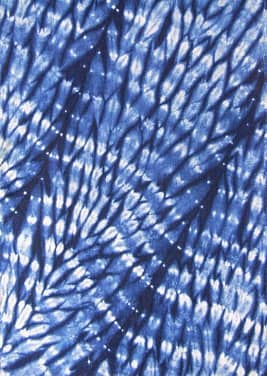Join Pacific Northwest Fiber artist, Judilee Fitzhugh, on a journey through what is considered the color that changed the world: indigo.
Over the course of this 2-day workshop students will learn the history and importance of indigo and the art of shibori, one of the oldest Indigo dyeing techniques in Japan. On the first day, Judilee will introduce students to the history of indigo, how to make a natural reduction indigo vat, traditional fiber resist techniques for shibori, and how to prep fabrics for the dye vat. The second day will be focused on dyeing the shibori fabrics and will end with a wrap-up and discussion, and sharing the results of the dyeing session.
All materials will be provided in the workshop. A silk scarf and an assortment of cotton fabrics will be provided; students may bring a cotton t-shirt, linen napkins, cotton socks, or up to one yard of natural fiber fabric to be dyed; these materials should be pre-washed and dried without fabric softener. Students are encouraged to bring any favored items that they have such as an apron and gloves. On the final day of the workshop, any student that would like to take home a sample of the indigo vat for further exploration, is asked to bring a one-gallon container with a tight fitting lid, such as a paint bucket.
Students are encouraged to bring a sack lunch. Coffee, tea, water and light snacks will be served. Please be advised that students should wear appropriate clothing and shoes, items that you won’t mind potentially being stained with indigo.

About the artist
Judilee Fitzhugh is a textile artisan who specializes in natural plant dyes and couture sewing. A tour of duty in Japan with the U.S. Navy led to a profound Japanese influence and a lifelong affection for indigo and plant fibers. Her finely crafted work combines natural objects with vintage fabric remnants, hand weaving and surface design to portray a single moment in history.